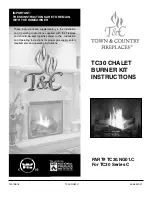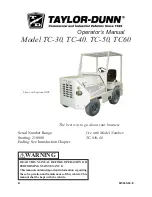
3
SAFETY INSTRUCTIONS FOR FORESTRY SKIDDING WINCHES
1.
Work safely!
The relevant health and safety regulations and the operating instructions must be
complied with.
2.
Operation and maintenance of the cable winch may only be entrusted to suitable and
reliable persons over 18 years of age who are familiar with this type of work.
3.
Wear personal safety equipment (helmet, safety shoes, protective gloves).
4.
Working alone is only permissible if there is a radio emergency call system.
5.
The cable winch must be checked before use, but at least once every working day, to
make sure that it is in perfect operating condition (safety guard, dead-
man’s circuit,
overload protection, brake function).
Any faults must be remedied professionally.
6.
The winch drive must be turned off when malfunctions are being remedied or repairs
and maintenance are being carried out. It is not enough to disengage the winch drive.
The drive motor of the skidder must be turned off.
7.
The safety devices on the winch must not be disabled.
8.
Only use load suspension devices, e.g. lifting hooks, choker cables, chains, pulleys
and straps, that are suitable for the pulling power of the winch.
9.
Only use stress-relieved cables of sufficient strength for pulling as per the
specifications on the cable winch’s name plate and the operating instructions. The
breaking load of the choker and skidding chains must be twice the pulling power
specified on the winch for the first turn.
10.
Damaged cables and chains must be replaced promptly.
11.
Do not use cables that are too long. When the cable is fully wound, the flange rings
must still project beyond the top turn by at least one and a half times the diameter of
the cable.
12.
Before starting the skidding winch, the machine operator must satisfy himself that no
one is in danger.
13.
The winch operator must make sure that at least two turns of the cable remain on the
drum under load except in a hazardous situation (adjust overrun brake correctly).
14.
Only wind the cable in under load (unwind cable completely and wind in evenly at
least once a day and more often if necessary).
15.
The winch must only be operated from a safe position where the winch operator is not
at risk from the winch itself, the load, the cable or the hi
tchings. The driver’s cab of
the skidder can be regarded as a safe position if there is an adequate safety guard
between the winch and the driver’s seat.
The winch operator must be provided with appropriate protection when operating the
winch from outside
the driver’s cab.
The skidder itself might be used as protection or the operator might stand at a safe
distance from the skidder behind a tree, for example.
If radio-controlled winch operation requires the winch operator to accompany the log,
he must stay close to the hitching.
Long logs can be accompanied at the side, next to the hitching, while log sections can
be accompanied from diagonally behind the load,
see figure 1
.
16.
From his position the winch operator must be able to keep the skidding load under
observation at all times; otherwise arrangements must be made to have the path of
Summary of Contents for W-4011
Page 1: ...Fransg rd Manual GB Tractor winch W 4011...
Page 11: ...9...
Page 12: ...10 A Max 30 Max 30 B B 2 B 1 C D E F...
Page 13: ...11 G H Max 4mm...
Page 15: ...13...
Page 16: ......


































